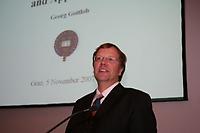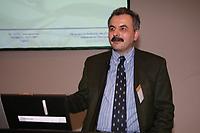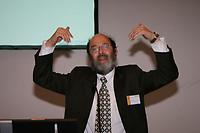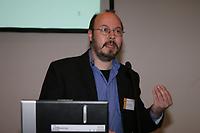Track 7: Software Technology
#
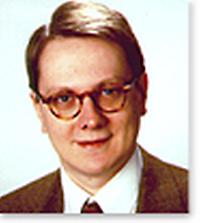
Gottlob Georg: Hypergraph Decompositions and their Applications to Constraint Satisfaction and Combinatorial Auctions
#
One of the best-known methods for decomposing graphs is the method of tree-decompositions introduced by Robertson and Seymour.
Many NP-hard problems become polynomially solvable if restricted to instances whose underlying graph structure has bounded treewidth. However, many problems are better described by hypergraphs than by graphs.
In this talk I will report hypergraph decomposition methods, and their application to database query optimization, to constraint satisfaction, and to the winner determination problem in combinatorial auctions. The latter are auctions where each bidder can place bids on sets of items rather than on single items.
About Georg Gottlob
From 1981 to 1987, he was affiliated with the Italian National Research Council in Genoa, Italy, and with the Politecnico di Milano, Italy. He was a research scholar at Stanford University, in 1999 an invited McKay Professor at UC Berkeley, and in 2002 a Visiting Professor of Univ. Paris VII.
Georg Gottlob was an invited speaker at many international conferences. He received the Wittgenstein Award, a Royal Society Wolfson Research Merit Award, and was elected member of the Austrian Academy of Sciences, of the German Academy of Sciences "Leopoldina", and of the Academia Europaea (London).
Messnarz Richard: European Qualification Network
#
EQN - European Qualification Network - is an EU Leonardo networking project which
- develops quality rules for job roles / professions offered in the European IT & Services market segment
- establishes a certification association which controls these quality principles and provides a computer supported infrastructure
- configures European self test and exam portal systems to enable same test processes and European based test questions pool for professions
With a modular flexible architecture an EU-wide agreed Skills Set was defined by a European Job Role Committee. Out of a Europe-wide pool of test questions automated by European portals courses (based on the same skills) are held.at universities or are organized by training companies.
He will explain the European Qualification Strategy (www.eu-certificates.org) which contains
- Skills Sets with skills architecture (learning achievements oriented) agreed across EU countries
- European Test Portals
- European Training Portals
- Certificates based on a credit point system per job role (covering skill elements)
- Personal learning strategy based on a EQF promoted level taxonomy
and discuss the opportunities of collaboration and the possibility of certificates (four certificate levels).
About Richard Messnarz
· TEAMWORK - Strategic E-Working Platform Development and Trial, 2001-2002
· ORGANIC (http://www.innovationmanager.org) - Innovation Management Strategies for Europe (2003 - 2006)
· EQN (European Quality Network) , http://www.eu-certificates.org
He is the general chair of EuroSPI (European Systems and Software Process Improvement and Innovation) Initiative. See EuroSPI 2007 at http://2007.eurospi.net , http://www.eurospi.net He is a principal ISO 15504 lead assessor. He is a founding member of the INTACS (International Assessor Certification Scheme) Board (www.intacs.info). In the CREDIT project he was responsible for the architecture of the systems and later became the project leader of the Capability Adviser system (Skills and ISO 15504 Assessment Portals) development. In the project EPI he was the technical manager responsible for the integratrion of Capability Adviser with a set of LMS (Learning management Systems) in Europe and Eastern Europe.
He is the moderator of industry task forces in Europe in the field of innovation and improvement:
- SOQRATES (www.sowrates.de) task forces (not to confuse with EU program) where 24 leading firms collaborate and exchange innovation knowledge (ZF Friedrichshafen, Siemens, Continental, T-Systems, Panasonic, G&D, etc.)
- S2QI task forces (Siemens, Magna, Flextronics, TU Graz, etc.)
Assessments of Processes and Skills Experience
· Lead assessor/consultant for Robert BOSCH Gmbh (www.bosch.com, largest automotive supplier in the world), Germany, 1993 - 1998
· Lead Assessor / consultant for SPICE assessments at ZF (www.zf.com, one of the largest automotive suppliers in the world) , Germany, 1998 - now. He is the lead SPICE assessor and consultant for the central research unit, production sites, and recently for the concern worldwide
· Lead assessor / consultant for SPICE for ContiTEMIC (www.temic.com, one of the largest automotive suppliers in the world) since 2003
· Leader of the SOQRATES Group (www.soqrates.de, supported by the Bavarian state) as lead assessor / consultant for 24 selected leading Bavarian technology companies in automotive, banking, and embedded systems in security. This initiative continues under his guidance from 2004 on a commercial basis (without state funds) and some larger German firms additionally joining
· Lead assessor and consultant to the VW concern group on behalf of AUDI (www.audi.de) for SPICE trial assessments at Audi/VW and their suppliers in 2001, resulting in a version 1 of the HIS assessment tailoring
This tailoring applies now as an assessment model for all suppliers of German automotive companies
· Lead assessor / consultant for Magna since 2005
· Etc.
Tjoa Min: Where and why we need semantic modelling in software engineering
#
A historical perspective of conceptual modelling and there interactions with software engineering concepts to demonstrate the necessity of accurate information modelling for the development of quality software is presented.
Based on this analysis which is inherently linked with Parnas’ information hiding principle current and future perspectives in the software engineering domain based on recent semantic modelling approaches will be investigated.
About A Min Tjoa
He was the president of the Austrian Computer Society from 1999 to 2003. He is member of the IFIP Technical Committee for Information Systems.
His current research focus areas are Data Warehousing, Grid Computing, Semantic Web, Security, and Personal Information Management Systems.
He has published more than 150 peer reviewed articles in journals and conferences. He is author and editor of 15 books.
Stumptner Markus: Model-based Software Debugging
#
A considerable body of work on model-based software debugging (MBSD) has been published in the past decade.
We summarise the underlying ideas and present the different approaches as abstractions of the concrete semantics of the programming language. We compare the model-based framework with other well-known Automated Debugging approaches and present open issues, challenges and potential future directions of MBSD.
About Markus Stumptner
Since 2001 Chair of Computing an the University of South Australia, Adelaide, head of the research group Knowledge & Software Engineering, since 2003 Director of the Advanced Computing Research Centre, co-founder of the "Mawson Institute for Advanced Manufacturing".
His present research interests are in the fields of Data- and Process Integration, model-based reasoning particularly within the ranges diagnosis and debugging.
Markus Stumptner is participant in the Collaborative Research Centres (CRCs - CRCs - distributed authority centers) for Enterprise Distributed Systems Technology, Integrated Engineering Asset Management and Advanced Automotive Technology. Present main project partners are amongst others General Motors/Holden, Australian Nuclear Science & Technology Organisation (ANSTO), Defense Science & Technology Organisation (DSTO).
Continue to Track 8
